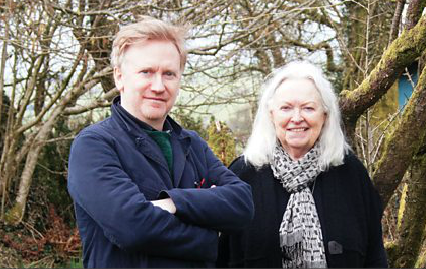Gillian Clarke is the subject of this week’s The Echo Chamber on BBC Radio Four.
The arts of Wales look in good health. The Sunday Times of April 29th carried a story that Keeping Faith had broken records for streaming numbers. 8 million plus viewers had accessed the iPlayer since February. As a story it appeared in the main news section. Online Alex Griffin-Griffiths was to be seen pounding the mean streets in a trailer for Sugar Baby. “Ichverkaufe Drogen in Fairwater” ran the subtitles. Dirty Protest’s hit show from Edinburgh was in Dresden. So too was Jo Fong. For those at home Radio 4’s The Echo Chamber was near Talgarreg in the company of Gillian Clarke.
Jean Seaton, official historian of the BBC, made a visit to speak in Aberystwyth in 2016. Among her topics she mentioned that, not so long back, the prospects for radio were deemed to be dire. As a medium it would wither against the dominance of the image. All futurology is flawed and technology intervened. The quality of signal improved and the car radio became universal. Radio not only has proved its advantage of flexibility, but it has re-established an area of primacy. It is the medium best suited for one important thing. It does words very well, for the reason that they come unmediated. Critics just a few weeks ago reported that Owen Sheers’ Green Hollow had not been best served on television. It grew in stature in the context of a book. A book has stillness.
The Echo Chamber has benefit of excellent editing and a richness to it that derives from three strands. The first strand is made by the sounds in and around Gillian Clarke’s home in Ceredigion. It opens with the poet on the telephone asking a friend, Lloyd, if she may come over and record the lambs. There is the sound of kitchen chairs scraping on the floor and she and presenter Paul Farley move outside. The field is indeed loud with the sound of sheep. They walk on to the water source for the smallholding. 54 feet down underground, it is, says Clarke, “ancient, ancient, water.” In the field she sees celandine popping up all over.
They return to the home for Welshcakes and to speak, among other things, of bees. This is the second strand, the words of the poet in conversation. Her latest book Zoology, says Farley, is finely tuned to the Welsh landscape. The poems teem with species, full of mammals, birds, all kinds of organisms. He wonders whether living where she does has made her more aware of the fragility of nature or its robustness. Clarke remembers their first ewes. She speaks of the risk to the land, as much as to the language, of the loss of hedgerow and song-birds. It is the landscape, she says, that keeps the language going.
Farley describes her home as a long house. “It is a long house”, she says, bought long ago in a condition of abandonment and dereliction. “I always wanted pigs and chickens, things like that.” On the making of poetry she cites R.S. Thomas: “I take a pen and paper to see what words will do.” She follows on to describe “the magic of the pen, the bare paper and the first words.” Poets are absorbed by words and she is entranced by the very names of grasses – fescue, quaking grass, bent. “Pandemonium,” she says, “was one of my first favourite words…I love the word parahelion.” She is impressed by a new generation of scientists writing poetry.
The third strand, intercut with the conversation and the landscape, is the poetry itself. She reads from her poem on the chestnut, its inspiration the tree once outside her window A poem, in memory of her father, Radio Engineer looks upward:“Up there somewhere between us and Orion hangs the ionosphere.” “Every single word, ever, sent on long-wave”, she adds, “still exists out there in the sky.” The longest reading is of Blaen Cwrt, the name of her home. It is 32 lines long and radio, comfortable with words, allows her to read it in its entirety. It ends with the essence of the place she has made her own, equally in life and art:
“Light on uncountable miles of mountain
From a big, unpredictable sky,
Two rooms, waking and sleeping,
Two languages, two centuries of past
To ponder on, and the basic need
To work hard in order to survive.”
Zoology is published by Carcanet.
The Echo Chamber, produced in Bristol by Ellie Richold, can be heard on the BBC iPlayer.











